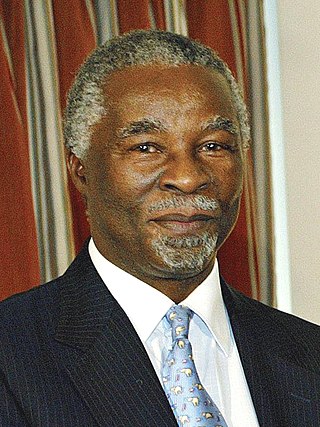
Thabo Mvuyelwa Mbeki is a South African politician who served as the 2nd democratic president of South Africa from 14 June 1999 to 24 September 2008, when he resigned at the request of his party, the African National Congress (ANC). Before that, he was deputy president under Nelson Mandela from 1994 to 1999.
Spirituals is a genre of Christian music that is associated with African Americans, which merged varied African cultural influences with the experiences of being held in bondage in slavery, at first during the transatlantic slave trade and for centuries afterwards, through the domestic slave trade. Spirituals encompass the "sing songs", work songs, and plantation songs that evolved into the blues and gospel songs in church. In the nineteenth century, the word "spirituals" referred to all these subcategories of folk songs. While they were often rooted in biblical stories, they also described the extreme hardships endured by African Americans who were enslaved from the 17th century until the 1860s, the emancipation altering mainly the nature of slavery for many. Many new derivative music genres such as the blues emerged from the spirituals songcraft.

Colored is a racial descriptor historically used in the United States during the Jim Crow Era to refer to an African American. In many places, it may be considered a slur, though it has taken on a special meaning in Southern Africa referring to a person of mixed or Cape Coloured heritage.

Matamela Cyril Ramaphosa is a South African businessman and politician serving as the 5th and current president of South Africa since 2018. A former anti-apartheid activist and trade union leader, Ramaphosa is also the president (leader) of the African National Congress (ANC).
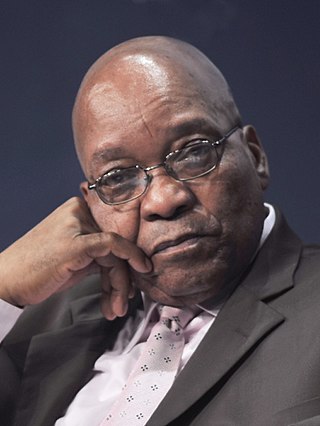
Jacob Gedleyihlekisa Zuma is a South African politician who served as the fourth president of South Africa from 2009 to 2018. He is also referred to by his initials JZ and clan names Nxamalala and Msholozi. Zuma was a former anti-apartheid activist, member of uMkhonto we Sizwe, and president of the African National Congress (ANC) from 2007 to 2017.

Apartheid was a system of institutionalised racial segregation that existed in South Africa and South West Africa from 1948 to the early 1990s. Apartheid was characterised by an authoritarian political culture based on baasskap, which ensured that South Africa was dominated politically, socially, and economically by the nation's minority white population. In this minoritarian system, there was social stratification and campaigns of marginalization such that white citizens had the highest status, with them being followed by Indians as well as Coloureds and then Black Africans. The economic legacy and social effects of apartheid continue to the present day, particularly inequality.
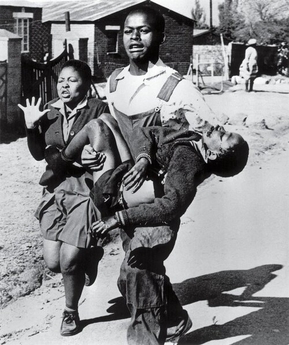
The Soweto uprising was a series of demonstrations and protests led by black school children in South Africa during apartheid that began on the morning of 16 June 1976.
The Ellis Park Stadium disaster was a crowd crush that occurred on 11 April 2001, claiming the lives of 43 people. Surpassing the Oppenheimer Stadium disaster, it became the worst sporting accident in South African history. Spectators poured into the Ellis Park Stadium in the city of Johannesburg, Gauteng, South Africa, for the local Soweto derby association football match between Kaizer Chiefs and Orlando Pirates. There was a 60,000 capacity crowd in the stadium, but reports suggest a further 30,000 more fans were trying to gain entry to the stadium. Reports also suggest that 120,000 fans were admitted into the stadium. An Orlando Pirates equaliser sparked a further surge by the fans trying to gain entry as they scrambled to see what had happened. The match was stopped after approximately 34 minutes of play when authorities received an unusually high volume of reported injuries.

South Africa, officially the Republic of South Africa, is the southernmost country in Africa. It is bounded to the south by 2,798 kilometres (1,739 mi) of coastline that stretches along the South Atlantic and Indian Oceans; to the north by the neighbouring countries of Namibia, Botswana, and Zimbabwe; and to the east and northeast by Mozambique and Eswatini. It also completely enclaves Lesotho. It is the southernmost country on the mainland of the Old World, and the second-most populous country located entirely south of the equator, after Tanzania. South Africa is a biodiversity hotspot, with unique biomes, plant and animal life. With over 62 million people, the country is the world's 23rd-most populous nation and covers an area of 1,221,037 square kilometres. Pretoria is the administrative capital, while Cape Town, as the seat of Parliament, is the legislative capital. Bloemfontein has traditionally been regarded as the judicial capital. The Constitutional Court, the country's highest court, is located in Johannesburg.

Thabang Sampson Makwetla MP is a South African politician affiliated with the African National Congress (ANC). He is a Member of the National Assembly of South Africa and is the current Deputy Minister of Defence and Military Veterans, a role he previously served in between 2009 and 2014. He has also served as the Deputy Minister of Justice and Correctional Services, and was Premier of Mpumalanga province between 2004 and 2009.
Corrective rape, also called curative rape or homophobic rape, is a hate crime in which somebody is raped because of their perceived sexual orientation. The common intended consequence of the rape, as claimed by the perpetrator, is to turn the person heterosexual.
The National People's Party was a political party registered on a national level with the Independent Electoral Commission (IEC) of South Africa. It came into existence when Badih Chaaban, a member of the Cape Town City Council crossed the floor from the Africa Muslim Party (AMP) in an attempt to wrest control of the city council from the Democratic Alliance-led multi-party coalition. The party was set up by Chaaban shortly before the floor crossing period in 2007 with the help of David Sasman, its interim leader. It should not be confused with the National People's Party, renamed the Minority Front, led by Amichand Rajbansi during the apartheid era.
Occupy South Africa was a South African initiative primarily aimed at protesting and inciting mass action against the racial, economic and social inequality in South Africa. It is part of the globally Occupy Wall Street movement. It consists of a loose informal affiliation of on the ground groups and individuals across South Africa as well as internet based groups. Groups such as Taking Back South Africa!, Occupy South Africa are involved in South Africa and online. The movement is also involved with the Marikana miners' strike.

The Marikana massacre was the killing of thirty-four miners by the South African Police Service (SAPS) on 16 August 2012 during a six-week wildcat strike at the Lonmin platinum mine at Marikana near Rustenburg in South Africa's North West province. The massacre constituted the most lethal use of force by South African security forces against civilians since the Soweto uprising in 1976 and has been compared to the 1960 Sharpeville massacre.

Orlando East Public Library is the oldest library in Soweto in South Africa.

The Patriotic Alliance (PA) is a South African political party, formed in November 2013 by, among others, businessmen Gayton McKenzie and Kenny Kunene.
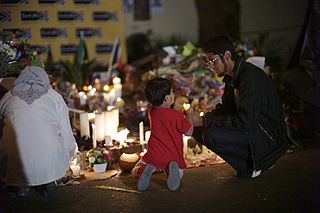
On 5 December 2013, Nelson Mandela, the first President of South Africa to be elected in a fully representative democratic election, as well as the country's first black head of state, died at the age of 95 after a prolonged respiratory infection. He died at around 20:50 local time (UTC+2) at his home in Houghton, Johannesburg, surrounded by family. His death was announced by then President Jacob Zuma on national television at 23:45. Reactions from governments, international organizations, and notable individuals, gained worldwide media coverage.
On 15 November 2014 workers at South Africa's major platinum producers – Anglo American Platinum, Impala Platinum, and Lonmin – went on strike demanding that wages be immediately doubled. However, after five months of striking they settled for a more modest pay increase spread over three years. It was the longest and most expensive strike in South African history.
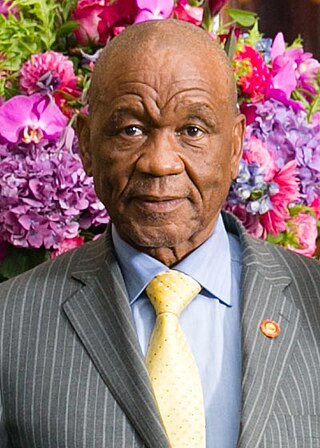
On 30 August 2014, Lesotho's Prime Minister Tom Thabane alleged that a coup d'état had been launched against him. This followed a previous allegation which caused him to suspend parliament over possible extra-constitutional manoeuvres. It also followed pressure from South Africa to maintain the democratic process. The next day, Deputy Prime Minister Mothetjoa Metsing assumed responsibility for running the government. An early election was held in February 2015 as a result of South African-led Southern African Development Community (SADC) mediation, giving power to the opposition.
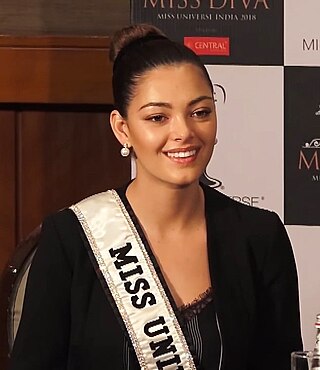
Demi-Leigh Tebow is a South African model and beauty queen who was crowned Miss Universe 2017. She was crowned Miss South Africa 2017, and the second Miss Universe winner from South Africa, following Margaret Gardiner, who was crowned Miss Universe 1978.













